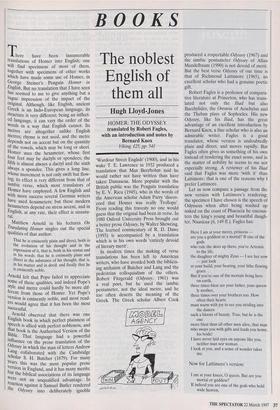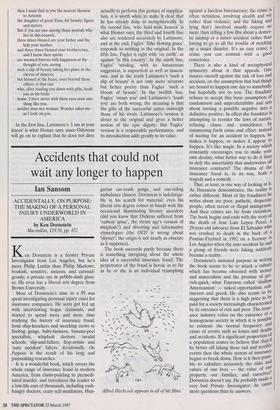BOOKS
here have been innumerable translations of Homer into English; one will find specimens of most of them, together with specimens of other works which have made some use of Homer, in George Steiner's Penguin Homer in English. But no translation that I have seen has seemed to me to give anything but a vague impression . of the impact of the original. Although, like English, ancient Greek is an Indo-European language, its structure is very different; being an inflect- ed language, it can vary the order of the words in a way that English cannot. Its metres are altogether unlike English metres; rhyme is not used, and the metre depends not on accent but on the quantity of the vowels, which may be long or short. Homer uses the hexameter, whose first four feet may be dactyls or spondees; the fifth is almost always a dactyl and the sixth always a spondee. This gives a long line, Whose movement is not only swift but flow- ing; its effect is very different from that of iambic verse, which most translators of Romer have employed. A few English and with more success several German writers have used hexameters; but these modern hexameters depend on stress accent, and in English, at any rate, their effect is unnatu- ral.
Matthew Arnold in his lectures On Translating Homer singles out the special qualities of that author:
That he is eminently plain and direct, both in the evolution of his thought and in the expression of it, that is, both in his syntax and in his words; that he is eminently plain and direct in the substance of his thought, that is, in his matter and in deed; and finally that he is eminently noble.
Arnold felt that Pope failed to appreciate some of these qualities, and indeed Pope's style and metre could hardly be more dif- ferent from those of Homer. Yet Pope's version is eminently noble, and most read- ers would agree that it has been the most successful.
Arnold observed that there was one English book in which perfect plainness of speech is allied with perfect nobleness, and that book is the Authorised Version of the influence That language had a powerful Influence on the prose translation of the Odyssey in which the man of letters Andrew -Lang collaborated with the Cambridge scholar S. H. Butcher (1879). For many years this was the most popular prose version in England, and it has many merits; but the biblical associations of its language werenot an unqualified advantage. In reaction against it Samuel Butler rendered the Odyssey into deliberately ignoble
The noblest English of them all
Hugh Lloyd-Jones
HOMER: THE ODYSSEY translated by Robert Fagles, with an introduction and notes by Bernard Knox Viking, £25, pp. 541 Wardour Street English' (1900), and in his wake T. E. Lawrence in 1932 produced a translation that Max Beerbohm said he would rather not have written than have taken Damascus. More popular with the British public was the Penguin translation by E. V. Rieu (1945), who in the words of the American scholar Adam Parry 'discov- ered that Homer was really Trollope'. From reading this travesty no one would guess that the original had been in verse. In 1980 Oxford University Press brought out a better prose Odyssey, by Walter Shewring. The learned commentary of R. D. Dawe (1993) is accompanied by a translation which is in his own words 'entirely devoid of literary merit'.
In modern times the making of verse translations has been left to American writers, who have avoided both the biblicis- ing archaism of Butcher and Lang and the pedestrian colloquialism of the others. Robert Fitzgerald (Odyssey, 1961) was a real poet, but he used the iambic pentameter, not the ideal metre, and he too often deserts the meaning of the Greek. The Greek scholar Albert Cook produced a respectable Odyssey (1967) and the iambic pentameter Odyssey of Allan Mandelbaum (1990) is not devoid of merit. But the best verse Odyssey of our time is that of Richmond Lattimore (1965), an excellent scholar who had a genuine poetic gift.
Robert Fagles is a professor of compara- tive literature at Princeton, who has trans- lated not only the Iliad but also Bacchylides, the Oresteia of Aeschylus and the Theban plays of Sophocles. His new Odyssey, like his Iliad, has the great advantage of an excellent introduction by Bernard Knox, a fine scholar who is also an admirable writer. Fagles is a good translator, whose version is undoubtedly plain and direct, and moves rapidly. But Fagles often gives us something of his own instead of rendering the exact sense, and in the matter of nobility he seems to me not especially strong. A reviewer of his Iliad said that Fagles was more 'with it' than Lattimore; that is one of the reasons why I prefer Lattimore.
Let us now compare a passage from the new version with Lattimore's rendering; the specimen I have chosen is the speech of Odysseus when after being washed up naked on the coast of Phaeacia he encoun- ters the king's young and beautiful daugh- ter, Nausicaa (6, 149 ff.). Fagles has:
Here I am at your mercy, princess are you a goddess or a mortal? If one of the gods who rule the skies up there, you're Artemis to the life, the daughter of mighty Zeus — I see her now — just look at your build, your bearing, your lithe flowing grace. . .
But if you're one of the mortals living here on earth, three times blest are your father, your queen- ly mother, three times over your brothers too. How often their hearts must warm with joy to see you striding into the dances
such a bloom of beauty. True, but he is the one more blest than all other men alive, that man who sways you with gifts and leads you home, his bride!
I have never laid eyes on anyone like you, neither man nor woman.. .
1 look at you, and a sense of wonder takes MC.
Now for Lattimore's version: I am at your knees, 0 queen. But are you mortal or goddess?
If indeed you are one of the gods who hold wide heaven, then I must find in you the nearest likeness to Artemis the daughter of great Zeus, for beauty, figure and stature.
But if you are one among those mortals who live in this country, three times blessed are your father and the lady your mother, and three times blessed your brothers too, and I know their spirits are warmed forever with happiness at the thought of you, seeing such a slip of beauty taking her place in the chorus of dancers; but blessed at the heart, even beyond these others, is that one who, after loading you down with gifts, leads you as his bride home. I have never with these eyes seen any- thing like you, neither man nor woman. Wonder takes me as I look on you.
In the first line, Lattimore's 'I am at your knees' is what Homer says; since Odysseus will go on to explain that he does not dare actually to perform this gesture of supplica- tion, it is worth while to make it clear that he has already done so metaphorically. In the second line, 'who hold wide heaven' is what Homer says; the third and fourth line also are rendered accurately by Lattimore, and at the end, Fagles' 'lithe flowing grace' responds to nothing in the original. In the fifth line, Fagles is right with 'on earth', as against 'in this country'. In the ninth line, Fagles"striding', with its Amazonian suggestion, is unpoetical as well as inaccu- rate, and in the tenth Lattimore's 'such a slip of beauty' is not only more accurate but better poetry than Fagles' such a bloom of beauty'. In the twelfth line, Fagles' sways you' and Lattimore's 'loads you' are both wrong; the meaning is that the gifts of the successful suitor outweigh those of his rivals. Lattimore's version is closer to the original and gives a better notion of the epic dignity. But Fagles' version is a respectable performance, and its introduction adds greatly to its value.



































































 Previous page
Previous page